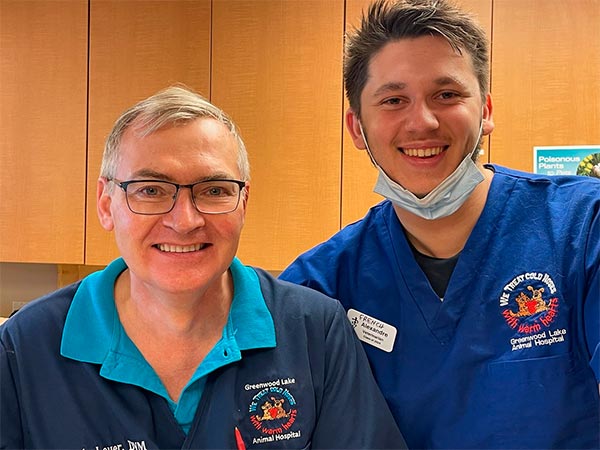Newsletter - September 2022
Introducing Alexandre Lemaire!
A first-year veterinary student from France, Alexandre Lemaire recently came to spend some time at Greenwood Lake Animal Hospital to learn what being a veterinarian in a different country is like. Fortunately, he had Dr. Louer to show him the ropes and offer some pointers!
Although his hospital experience touched on things he had not yet learned in vet school, Alexandre said he found the internship "rewarding" and a "real pleasure."
He also said it "was a really great time" and thanked the staff for "trying to explain things to me."
Thank you for visiting GWLAH Alexandre and we wish you much success in your studies!

Parvo Alert
NorthStar VETS veterinary emergency and specialty hospital in New Jersey has issued a warning to the public due to an increase in Canine Parvovirus type 2. According to a release from the hospital, the past several months-to-years have shown an increase in patients infected with Parvovirus.
"We want pet parents to be aware that untreated Parvovirus has a fatality rate of more than 90%, and to consider vaccinating their at-risk pets to prevent the spread of this highly contagious disease," Deborah Mara, VMD, said. "Vaccination can be performed by their regular veterinarian."
Parvovirus is most common in younger dogs, who have not completed their puppy vaccine series, but it can affect dogs of all ages. The virus is spread between dogs, through dog-to-dog contact, and through indirect contact with the dog's environment or people they interact with. Although an effective vaccine for Parvovirus is widely available, there is no cure for this fatal disease.
The signs and symptoms of Parvovirus include:
- Abdominal pain
- Bloody diarrhea
- Lethargy
- Loss of appetite
- Vomiting
"Parvovirus can remain on surfaces for up to six weeks, so cleaning surfaces with which pets come into contact is equally important, and positive cases should be isolated from all unvaccinated or at-risk dogs," Steven Berkowitz, DVM, DACVECC, said.
Rabies is alive and well and living in NJ
World Rabies Day is observed each year on Sept. 28 and seeks to spread awareness about the dangers of rabies and how it can be eradicated.
Around the world, dogs are the most common animal affected by rabies, with more than 99% of human cases coming from dog bites. More than 60,000 people die from rabies infection annually worldwide.
This is why municipalities mandate rabies vaccinations for companion animals - because of the potential for rabies to spread to humans from their dogs and cats.
This World Rabies Day, do your part to help stop the spread of what the World Health Organization deems a 100% preventable disease. Call GWLAH to schedule your pet's rabies booster today!
It's National Pet Health Insurance Month . . .
. . . and GWLAH wants to make sure that you have all the knowledge you need to keep your pet safe and healthy.
Sadly, many people are either unaware of pet health insurance or feel that it is not worth the monthly cost. However, research shows that pet insurance can be extremely helpful for any pet owner, both financially and emotionally.
Sudden accidents or illnesses can be challenging for veterinarians to treat, which can result in multiple visits and bills. Many people take their chances and hope that something devastating won't happen to their pet, but, unfortunately, that isn't always the case.
Pet insurance is there to cover veterinary costs incurred by unexpected accidents, major illnesses, or diseases. Even if you have to pay up front, pet insurance will usually reimburse a large percentage of the cost for things like surgery, emergency visits, accidents or sickness.
While there are many different companies out there, GWLAH recommends ASPCA Pet Health Insurance. You can get a quote for coverage on your pet at https://www.aspcapetinsurance.com/wecoverthat/?priorityCode=AD20549#/start, and they offer a multiple pet discount as well.
There are more than 154 million pets in North America, but only 4.4 million were documented as being insured last year. In many cases, pet parents don’t have the financial means to care for their pet in the event of an emergency and are forced to make a heartbreaking decision because they couldn’t afford to pay the bills.
It may be daunting to have another monthly bill to pay, but, in the long run, pet insurance can be a small price to pay for the health of your pet and for your own peace of mind.
Sept. 24: International Rabbit Day
Although we would love to celebrate bunnies every day, International Rabbit Day is especially observed on the fourth Saturday of September to promote the care and protection of domestic and wild rabbits.
Dogs and cats may be hospital regulars, but rabbits need routine veterinary care too!
Here at GWLAH, Dr. Price is available to care for all your floppy-eared family members' needs. From wellness checks to sick visits, Dr. Price has the experience your bunny needs to live a happy and healthy life.
If you have any concerns about your rabbit's health or it's simply time for a check up, give us a call to schedule an appointment with Dr. Price!